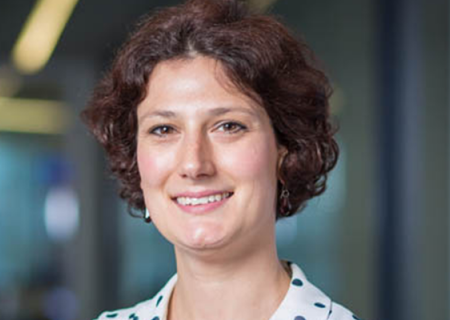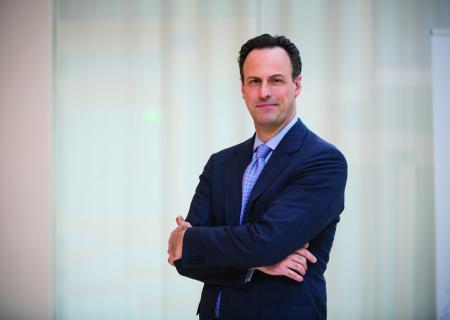Wisdom, Cooperation and Leadership
An Interview in Jan Peter Balkenende
Jan Peter Balkenende, former Prime Minister of the Netherlands (2002-2010), enthralled delegates at this year’s INREV Annual Conference. In a blistering keynote address, Mr Balkenende shared his clear-sighted perspective on a range of critical issues, from the conflict in Ukraine to re-establishing geopolitical stability, achieving a sustainable economic recovery, and the importance of creativity and inspiration in political discourse. IQ caught up with him afterwards to dig deeper into his insights.
What’s your take on the situation in Ukraine?
I met Putin several times when I was Prime Minister and when I was in Moscow, I also had the possibility to speak with NGOs – that’s not possible now. The situation then was completely different compared to what we see now. When Putin came back as President, you could see he was radicalising more and more, then you got Crimea. I think he always had ideas about [an enlarged] Russia, but what’s happening right now in Ukraine is causing loads of destruction, and it is also not in the interests of Russia. Putin is not accepting the fact that the people in the Baltic states and Ukraine want to make their own choices. It is really strange that we are going back in history, and this is unforgivable.
As to the outcome of the conflict, there are several scenarios. Ukraine might win the war. Another is that Russia continues to focus on the Eastern part and have a bridge to Crimea. A third is a frozen conflict. But this is all speculation. The big risk is a further escalation for example the use of nuclear or chemical weapons. This war must come to an end.
What’s happening in Ukraine will have consequences for decades because people feel that it is so terrible, and they will never forget it. I’m really concerned about these long-term consequences of this war.
What three things would you suggest the G7 should do to re-stabilise the geopolitical landscape and the global economy?
What is important to underline is that values are extremely important to shine a light on our future. You can talk about money and markets but it’s much more than that. Today, for companies, organisations, universities, and institutions, it’s all about the DNA: ‘How do you answer the why question?’ ‘What are our values?’ This moral reflection is absolutely necessary.
Talking about the G7 and what could be done in the current circumstances, it’s so much about stability worldwide. My recommendation would be to use the Sustainable Development Goals (SDGs) because this can be very helpful in creating a common ground on where to aim for. Another point is to ask, ‘what’s the lesson from history?’ We all know that wars are never a solution. What’s happening now in Ukraine is terrible, and, unfortunately, there are many more ongoing wars in the world.
My recommendation would be to use the Sustainable Development Goals (SDGs) because this can be very helpful in creating a common ground on where to aim for
In his book How to run the world, Parag Khanna said that if you want to find solutions for all the global issues of today, it’s a matter of having new alliances – alliances between governments, NGOs, religious groups, big multi-national corporations and others, to find solutions. He also said we can see the fading away of the concept of the nation state. But the nation state is back. So, if you talk about the G7 I think it’s so important that nation states must have the will to work together, otherwise you’ll be talking about the national interest. An organisation like the G7 can talk in terms of what we have in common – how we can make progress. This is really key; it’s a kind of spirit we must have again. Sometimes you need a crisis to see that there’s another way.
The terrible thing now is that we have dictators in the world creating an atmosphere in which it’s difficult to realise those goals [SDG] because it’s about self-interest. And the world needs something completely different. We need wisdom. We need cooperation. We need true leaders. There also must be a balance between state and society – democracy is key, and the majority must show respect for the minority. And we must generate an inclusive economic system in which there’s a place for everyone.
How important is effective communication in solving the big issues the world faces today?
I’m really concerned that we’re not reaching each other. I referred to the G7 meeting in March 2009 in London because there was a connection between governments – a common understanding. We had to find solutions together. Now the world is really split apart.
It’s so important that people communicate – that they talk to get a better understanding. Communication is key, but there’s also the matter of honesty and that’s what you can see now – it won’t help if you are attacking cities and just denying that you’re doing it.
And listening is crucial. It means you’re really taking things seriously. If you don’t have the willingness to listen and act on the basis of listening, then you have difficulties.
The terrible thing now is that we have dictators in the world creating an atmosphere in which it’s difficult to realise those goals [SDG] because it’s about self-interest. And the world needs something completely different. We need wisdom. We need cooperation. We need true leaders
But we can also learn from history. The lesson of European history is that – despite the fact that we have made many, many mistakes – when we’ve made progress it was a matter of trying to find solutions but also listening to others. Because of the fact that Germany was honest about its Nazi past, we could build bridges and have a new start after the Second World War. And at the end of the apartheid regime people said, ‘we must go to our history’, and this led to the truth commissions that allowed people to express what happened. You must have honesty and truth in order to be able to find a new road for the future.
You’ve talked about drawing inspiration from architects and their creative thinking. Can you tell us more?
I like architects because they are so creative and inspiring. It’s not only about nice designs for buildings; it’s much more about the philosophy behind it.
When we had a committee on the future of Europe, we said we must have an architect because they would give us different perspectives, by drawing together health and buildings and by making connections. Thomas Rau, the German architect, constantly references the circular economy approach and the care that must be taken in designing buildings to make sure materials can be re-used.
This is creative thinking and that’s fundamental for the new economy – it’s all based on new ideas. We need to make some breakthroughs. If you see the agenda today – climate change or scarce environmental resources – whatever the issue, we need new views and ideals.
And creativity is not only about age, it’s more than that because you can have young people who are very traditional, and you can have old politicians who are willing to change. When Frits Philips – one of the family members of the Philips company – turned 100 years old, he was asked the question ‘when are you old?’ and the answer was ‘you’re old when you stop learning’. It’s a matter of the willingness to learn.
You can also learn so much from sportspeople. The stories about how to cope with success or failure; how to go on. The lessons about the importance of team – team spirit, team building, and having the right strategy – you can use this everywhere.
Finally, it’s about people, belief, and passion. It’s so important that we can be inspired by others, that we believe in what we’re doing and that we do our work with passion.









